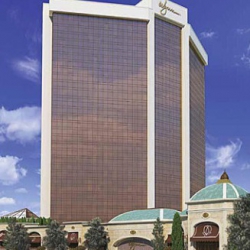
Wynn Resorts Will Build a $1.6 Billion Casino in Everett near Boston, If the Statewide Vote Goes Well
Wynn Resorts has won the right to build a $1.6 billion casino on the banks of the Mystic River in the city of Everett. The Massachusetts Gambling Commission voted 3-1 in favor of Steve Wynn’s development plan, which defeated a joint $1.1 billion plan by Mohegan Sun and Suffolk Downs for a Revere casino.
The decision came after 5 days of deliberation by the state gaming panel and 7 years of lobbying for a Boston-area land-based casino complex. The plan still has to clear one last hurdle. Massachusetts voters will decide in November whether to approve a casino license at all. Previously, voters had approved a casino bill in 2011, but some believe that was a panicked decision during an economic downturn. Whether voters still want a Boston casino is still a matter of debate.
Suffolk Downs Announces a Closing
In the wake of the decision, Suffolk Downs announced it would not seek a 2015 license for operations. At first, it was speculated this would mean a lay-off of workers, but the 80-year old racetrack would remain in operation. Later, it was determined that the owners of Suffolk Downs are going to close the struggling facility.
When the 2011 casino approval election was successful, it was assumed by most people in Massachusetts that Suffolk Downs would be a beneficiary. The owners of Suffolk Downs are well-connected politically, and thus seemed to be perfectly positioned to win the casino licensing process.
Las Vegas Companies Simply Had Better Funding
As time went on and outside gaming interests got involved, Suffolk Downs’ began to face an uphill fight. Caesars Entertainment, which owns more casinos in the United States than any other gaming company, pursued a Boston casino license. Wynn Resorts is a rival Las Vegas casino company, but its resources have been increased in recent years by the enormous revenue generated from their Macau gaming interests. Macau’s gambling industry makes 7 times the revenue that Las Vegas’s gambling industry makes each year.
With such funds at his disposal, casino mogul Steve Wynn was able to put together a development plan for a $1.6 billion integrated casino resort. Wynn’s proposal was extravagant by any standards, including a $30 million donation that will clean the Mystic River with 250,000 oysters.
Mohegan Sun’s Plan for Revere and East Boston
Eventually, Caesars Entertainment lost in the bidding process. That left only Mohegan Sun, which is owned by the Mohegan Native American tribe of Connecticut. The Mohegan Sun is the largest casino in the world, by sheer space. Yet that gaming destination has had its share of revenue problems in the last few years, as its leaders planned a vast expansion just before the 2008 real estate market crash.
Joint Plan by Mohegan Sun and Suffolk Downs
Suffolk Downs has had similar money problems. In the case of Boston’s famous racetrack, its revenue issues stemmed from a nationwide downturn of interest in horse racing and dog racing. In many parts of the US, racetracks only stay open if they are allowed to host casino-style gambling in the form of slot machines and table games. It became apparent that the Depression-era Suffolk Downs needed a major infusion of cash to survive.
That opportunity seemed to arrive when the Mohegan Sun began having problems with its plan for a casino development that overlapped the city boundary line between Revere and East Boston. When the people of East Boston voted down casino gambling, Mohegan Sun had to find a plan in which all the land was inside Revere’s boundaries. They turned to Suffolk Downs, and the two gaming interests partnered on a $1.1 billion plan.
Gaming Commission Had Concerns about Revere Plan’s Financing
Late in the process, the Massachusetts Gaming Commission appeared to have qualms about the Revere plan. A week ago, the Commission told Mohegan Sun that it had concerns that too much of the spending in its plan went to non-building costs, such as financing. In other words, the Mohegan Sun/Suffolk Downs plan appeared to be too heavily leveraged. In a letter reply to the commission, Mohegan Sun said it had secured an additional $100 million in equity, which it hoped would calm fears of its leveraged plan.
In the end, the Mohegan Sun’s plan simply wasn’t enough. Perhaps the proposal always faced an uphill struggle, because it pumped $1.1 billion in construction money into the local economy, while the Wynn Resorts plan pumped almost 50% more with its $1.6 billion plan. When you consider that the Mohegan Sun’s development spent more on financing, that meant that the disparity was even greater, because much of the spending would go to banks–not construction companies. In that scenario, the Wynn Resorts development might represent twice the up-front benefit to the local Boston economy and job market.
